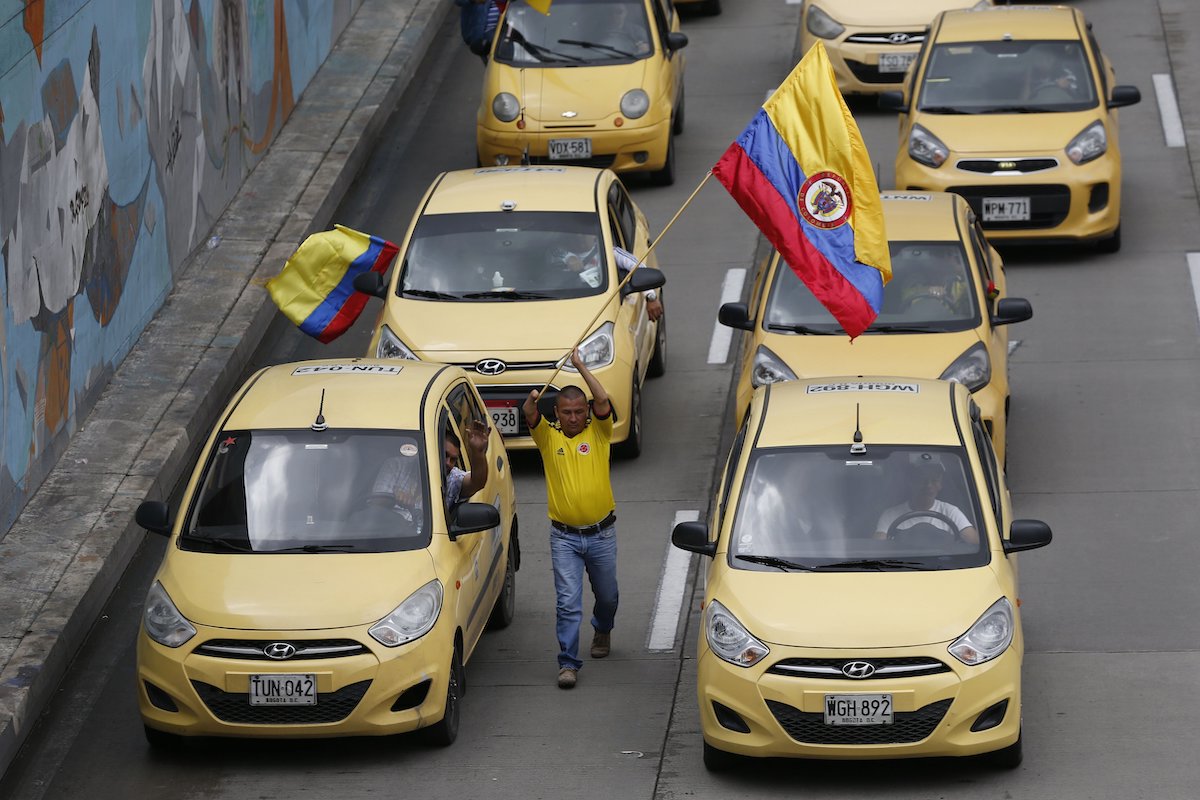

In this May 10, 2017 file photo, taxi drivers strike to pressure the government to ban the ride-sharing app Uber, in Bogotá, Colombia. (AP Photo/Fernando Vergara, File)
By MANUEL RUEDA, Associated Press
BOGOTÁ, Colombia (AP) — Uber restarted operations in Colombia Thursday after shutting down its app for almost three weeks, saying it had found “new alternatives” to work legally in the Latin American country, one of several where the company has faced resistance from unions and legislators.
Uber said that from now on, its app will help users in Colombia enter contracts with drivers in which they are “renting” the vehicles along with the drivers’ services. Opponents say the app competes unfairly against taxi drivers and evades some taxes.
A spokeswoman for the company said the app is looking for ways to add taxi drivers to its Colombia platform.
“We want to offer a diversity of services that will allow traditional, and new alternatives (for transport) to coexist,” read a statement from Uber.
In December, Colombia’s Superintendency for Industry and Commerce had ordered Uber to shut down, following a lawsuit from a taxi company. The superintendency said Uber was providing transport in an “unregulated” fashion, and was diverting customers away from taxis that pay licensing fees.
Uber complied with the ruling but argued that it went against a free trade agreement between Colombia and the United States. The company also said the ruling was discriminatory as it only told Uber to cease operations, and did not address similar apps that also operate in Colombia, including Cabify, Didi and Beat.
On Thursday, taxi unions and legislators expressed skepticism that Uber’s new “rental” approach complies with laws regulating public transport in Colombia.
“It’s a mockery of the law,” Ernesto Sandoval, general manager of Taxis Teleclub, a Bogotá cab company, told Caracol radio. “You can’t provide public transport and say it’s a rental service.”
“This just shows you how in Colombia companies with money can do whatever they desire,” said Jose Orlando Herrera, a Bogotá cab driver, who said that he had to pay $25,000 for his licensing fee.
Herrera took a large loan to pay for his license, and says that every day he must earn around $60 to cover his debts, and have some money left for himself. He said that since Uber started to operate in Colombia, in 2013, he has had to work longer hours.
“It’s unfair” he said.
But others have praised the app for providing work to people who are struggling to find employment, or are unable to work full time jobs.
Eliana Quintero, a single mother who has been an Uber driver for the past two years, said she was “ecstatic” about the platform’s return.
“My car is not allowed to circulate today,” she said. “But tomorrow I will be up at 4 a.m. driving.”
Quintero says Uber’s flexible work hours allow her to spend more time with her son —who recently recovered from lung cancer— while making enough money to sustain her family. She credits Uber with giving her a new chance to enter the labor force, after being unemployed for years.
“I am 42 and it’s hard to get a new job at my age,” she explained.
Uber said in January that it had 88,000 affiliated drivers in Colombia, and approximately 2 million users. Legislators are currently working on a law that would regulate ride-sharing apps and make them pay social security for drivers, as well as taxes on their earnings.
Uber has faced numerous lawsuits across Latin America. Mexico has regulated Uber and other apps, which now pay state taxes, while in Brazil the supreme court recently ruled Uber drivers are not employees but independent contractors who need not be paid social security.


